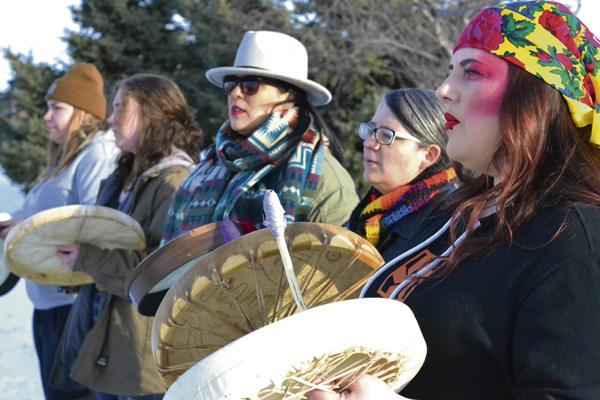
“We are connected to the earth as one, as a nation.” – Talon Halsall
A Prince Albert group is hosting peaceful gatherings to stand in solidarity with British Columbia’s Wet’suwet’en First Nation.
Hereditary Chiefs in the unceded territory—meaning they never gave up their Indigenous authority to Canadian government—say they have not given consent to the construction of a natural gas pipeline running through the land.
Coastal GasLink workers have already began construction on the 670-kilometre, $6.6 billion pipeline. It will run across northern B.C., with Wet’suwet’en being one First Nation along the route.
“The approved Coastal GasLink route was determined by considering Indigenous, landowner and stakeholder input, the environment, archaeological and cultural values, land use compatibility, safety, constructability and economics,” reads Coastal GasLink’s website.
“The whole world is watching the struggle that these people and this region have had for decades,” said Al Grigori, one of the local demonstration’s organizers.
“It’s the perfect time to have our voices asserted and to show the diversity of Indigenous people across Canada and how we can stand together.”
The group were singing and drumming in prayer on both Thursday and Friday.
On Thursday, they were situated on the corner of 26th Street and Second Avenue West. On Friday, they sang and drummed in the Cornerstone area in front of the BMO Bank of Montreal.
Many people driving by honked at them, smiling and waving from inside of their vehicles. However, as Grigori explained, it’s been difficult to ignore a couple of negative comments on Facebook.
Although the pipeline has support from the elected band council, a form of government introduced in the Indian Act, some Wet’suwet’en hereditary chiefs are starkly against the project. Hereditary chiefs are a form of Indigenous governance preceding colonization.
Since Jan. 1—when Wet’suwet’en issued an eviction notice for Coastal GasLink workers—solidarity protests have exploded. RCMP have arrested several protesters and even media.
Protestors have also disrupted rail operations across the country. Several political leaders and business organizations have called to an end to the rail blockades, citing damage to the economy.
Federal Indigenous Relations Minister Carolyn Bennett has vowed to meet with protestors, and on Friday, Prime Minister Justin Trudeau said rail blockades “must now come down.”
Grigori said she’s seeing a false narrative across social media of “First Nations people being anti-oil and anti-gas.”
“This issue is so much bigger than that, and so I do hope that this raises awareness about the complex nature of our country and the complex legalities and the rights of Indigenous people that are continually being violated,” she said.
“I really hope that people start looking at the broader issues that are really underlying this.”
Talon Halsall and Avery Berezowski are participating in the initiative in Prince Albert simply to show that all human beings are connected and must come together.
“As people, we are all related. We may not be blood related, but we are spiritually related. We are connected to the earth as one, as a nation,” said Halsall, who’s 16 years old.
“It’s a beautiful site to see, when all nations, colours, races all come together.”
Berezowski said their group may be small, but all efforts of support are significant.
“Even if the numbers aren’t large, it’s still support and knowing that you have people standing for you and with you, it might make you feel stronger about your situation,” the 14-year-old said.
“We might not be there fighting this battle with them, but we’re doing our part here.”

